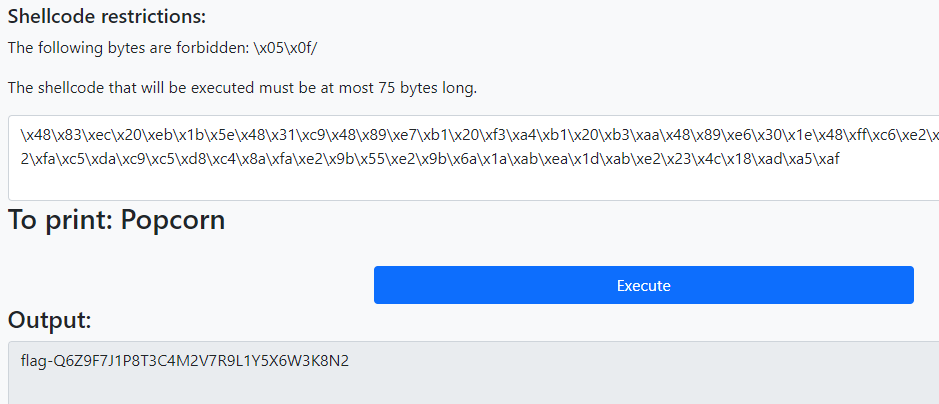UnitedCTF 2024 Shellcode Obfuscation 2 writeup
This is the level 2 of the Shellcode Obfuscation series.
General instructions
- For each level, you must execute code that will print the expected string on STDOUT.
- The only syscalls allowed are write on stdout and exit.
- The architecture is AMD64.
- The shellcode format must be in hexadecimal (
\x00\x01\x02). - The program that runs the shellcode was compiled with
gcc -z execstack -fno-stack-protector -o [executable] [source.c]
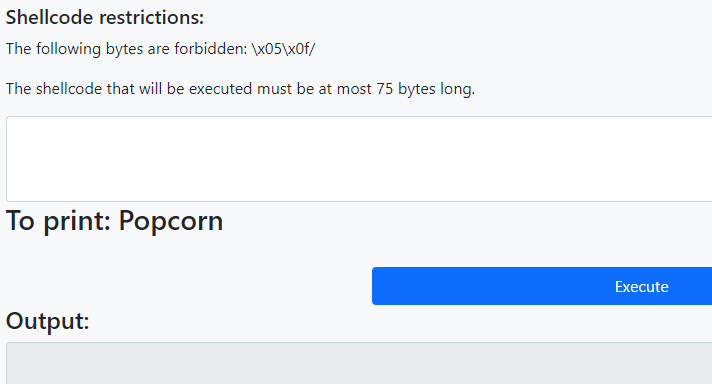
The main restriction of this challenge is avoiding the 0x05 and 0x0f bytes which represent the syscall opcode
While doing the challenge I couldn't manage to find a easy way to invoke syscall without calling it directly in the code so I figured I would likely want to encode a part of the shellcode to obfuscate the 0x0f05 bytes.
I already had a basic shellcode from the level 1 to start with:
section .text
global _start
_start:
xor rax, rax
mov eax, 0x61706170
push rax
mov rax, 0x20e0206562726142
push rax
xor rax, rax
mov al, 0x01
xor rdi, rdi
mov dil, 1
mov rsi, rsp
mov dl, 13
syscall
It writes a string to the stack and then calls the write syscall. For this challenge, the first part could be modified to the following to print Popcorn:
section .text
global _start
_start:
xor rax, rax
mov rax, 0x206e726f63706f50
push rax
xor rax, rax
mov al, 0x01
xor rdi, rdi
mov dil, 1
mov rsi, rsp
mov dl, 7
syscall
Then i searched the web for different basic shellcode obfuscation techniques and stumbled on XORing shellcode directly.
https://lastlistener.github.io/Courses--SLAE--7_Shellcode_Crypter.htm
https://4xura.com/pwn/create-a-shellcode-encoder-for-binary-exploit/
So I did something similar to the links above, I wrote an assembly program that would xor a part of itself using the jmp-call-pop technique. I opted to write the shellcode to the stack since while debugging an other solution that xored the shellcode bytes in place, the area was non-writeable and I tought it would also be on the challenge so I just stuck with writing it to the stack which was shown as executable in the challenge instructions.
section .text
global _start
_start:
sub rsp, shellcode_len ; create room on the stack
jmp short call_encoded_shellcode
shellcode:
pop rsi
; move the shellcode to the stack
xor rcx, rcx
mov rdi, rsp
mov cl, shellcode_len
rep movsb
mov cl, shellcode_len
mov bl, 0xaa ; XOR key
mov rsi, rsp
decode_loop:
xor byte [rsi], bl
inc rsi
loop decode_loop
jmp rsp
call_encoded_shellcode:
call shellcode
encoded_shellcode:
db 0x00 ; xored shellcode to encode will be put here
shellcode_len equ $ - encoded_shellcode
Now, the asm code that prints Popcorn can be XORed with 0xaa and added to the code above.
I used this toolchain to build assembly code and convert it to shellcode:
build-shellcode.sh
#!/bin/bash
if [ -z "$1" ]; then
echo "Usage: $0 <filename>"
exit 1
fi
run_flag=false
if [ "$2" == "--run" ]; then
run_flag=true
fi
filename=$(basename -- "$1")
filename_noext="${filename%.*}"
nasm -f elf64 "$1" -o "${filename_noext}.o"
ld "${filename_noext}.o" -o "${filename_noext}.linked"
execstack -s "${filename_noext}.linked"
python parse-shellcode.py "${filename_noext}.linked"
if [ "$run_flag" == true ]; then
echo
echo "Executing"
./"${filename_noext}.linked"
fi
parse-shellcode.py
#!/usr/bin/python3
import sys
from pwn import *
context(os="linux", arch="amd64", log_level="error")
file = ELF(sys.argv[1])
shellcode = file.section(".text")
print(f"\n{str(len(shellcode))} bytes")
print('\n' + shellcode.hex() + '\n')
print(''.join([r'\x{:02x}'.format(c) for c in shellcode]) + '\n')
print(','.join(['0x' + r'{:02x}'.format(c) for c in shellcode]) + '\n')
for c in shellcode:
if c in [0x00, 0x05, 0x0f]:
print(r"{:02x} byte found".format(c))
Then, compiling and printing the shellcode for the Popcorn asm:
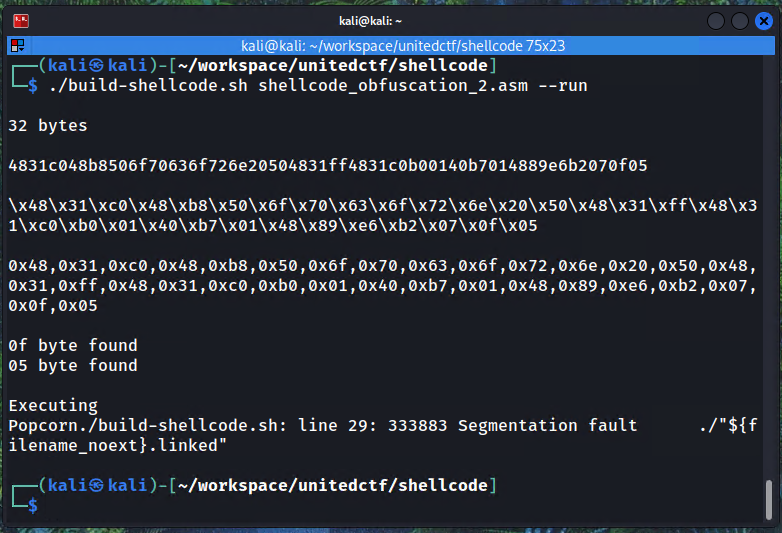
The warning for 05 and 0f is fine since this is the shellcode that will be XORed to not have them.
The segmentation fault is also fine, it's just that the exit syscall was omitted to reduce the length of the shellcode that must remain under 75 bytes.
Now the shellcode can be xored it with 0xAA using cyberchef, checking if the output still doesn't contain any prohibited bytes with a quick ctrl+f.
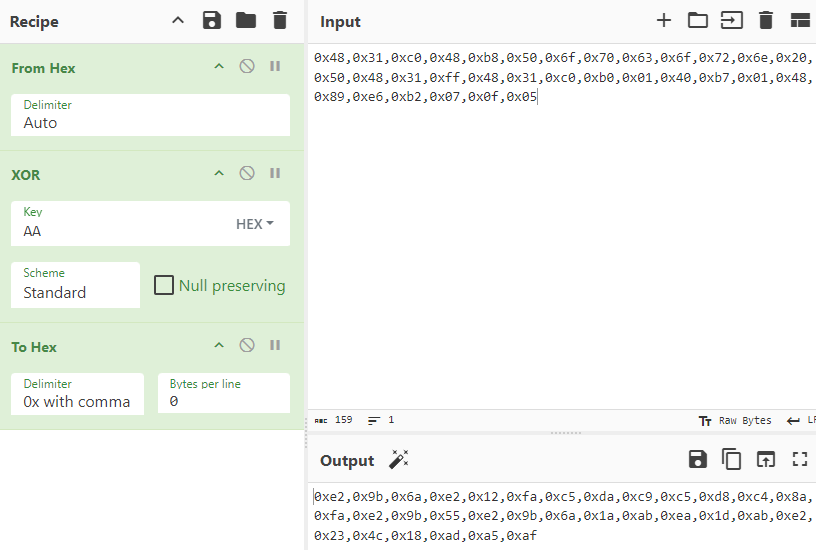
The output can then added to the previous asm code
call_encoded_shellcode:
call shellcode
encoded_shellcode:
db 0xe2,0x9b,0x6a,0xe2,0x12,0xfa,0xc5,0xda,0xc9,0xc5,0xd8
db 0xc4,0x8a,0xfa,0xe2,0x9b,0x55,0xe2,0x9b,0x6a,0x1a,0xab
db 0xea,0x1d,0xab,0xe2,0x23,0x4c,0x18,0xad,0xa5,0xaf
The asm can finally be compiled to produce the final shellcode.
We see no warnings so the prohibited bytes are not present.
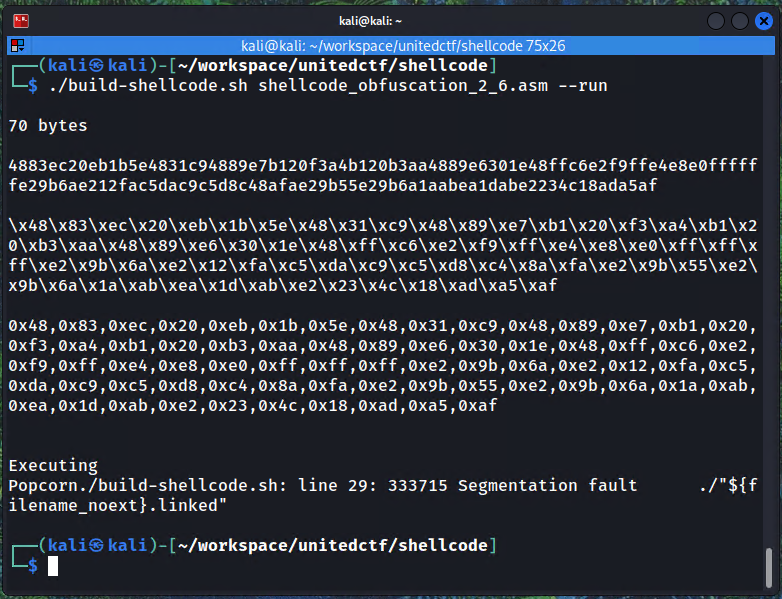
This was the final shellcode, which when sent as the answer reveals the flag.
